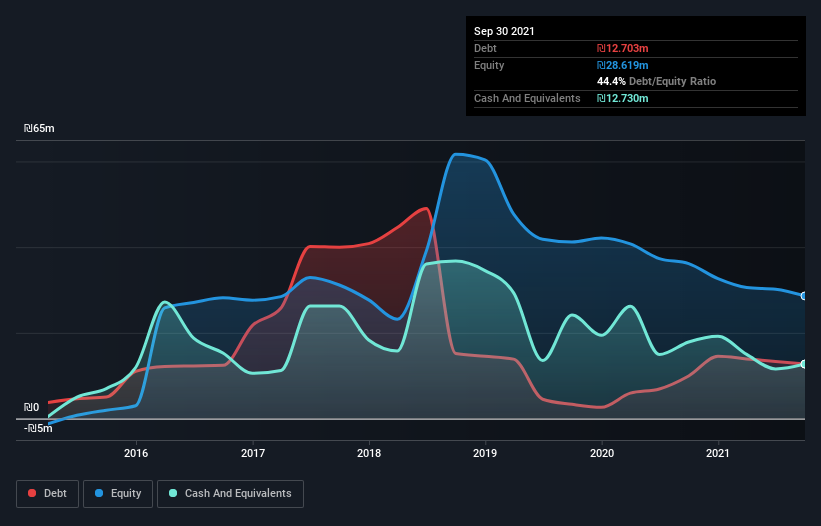
Warren Buffett famously said, 'Volatility is far from synonymous with risk.' It's only natural to consider a company's balance sheet when you examine how risky it is, since debt is often involved when a business collapses. We can see that Cofix Group Ltd (TLV:CFX) does use debt in its business. But should shareholders be worried about its use of debt?
When Is Debt A Problem?
Generally speaking, debt only becomes a real problem when a company can't easily pay it off, either by raising capital or with its own cash flow. In the worst case scenario, a company can go bankrupt if it cannot pay its creditors. However, a more usual (but still expensive) situation is where a company must dilute shareholders at a cheap share price simply to get debt under control. Of course, debt can be an important tool in businesses, particularly capital heavy businesses. The first step when considering a company's debt levels is to consider its cash and debt together.
View our latest analysis for Cofix Group
What Is Cofix Group's Debt?
You can click the graphic below for the historical numbers, but it shows that as of September 2021 Cofix Group had ₪12.7m of debt, an increase on ₪9.95m, over one year. But on the other hand it also has ₪12.7m in cash, leading to a ₪27.0k net cash position.

A Look At Cofix Group's Liabilities
Zooming in on the latest balance sheet data, we can see that Cofix Group had liabilities of ₪94.5m due within 12 months and liabilities of ₪128.0m due beyond that. Offsetting this, it had ₪12.7m in cash and ₪13.2m in receivables that were due within 12 months. So it has liabilities totalling ₪196.5m more than its cash and near-term receivables, combined.
This is a mountain of leverage relative to its market capitalization of ₪203.2m. This suggests shareholders would be heavily diluted if the company needed to shore up its balance sheet in a hurry. Despite its noteworthy liabilities, Cofix Group boasts net cash, so it's fair to say it does not have a heavy debt load!
It is well worth noting that Cofix Group's EBIT shot up like bamboo after rain, gaining 87% in the last twelve months. That'll make it easier to manage its debt. When analysing debt levels, the balance sheet is the obvious place to start. But it is Cofix Group's earnings that will influence how the balance sheet holds up in the future. So if you're keen to discover more about its earnings, it might be worth checking out this graph of its long term earnings trend.
But our final consideration is also important, because a company cannot pay debt with paper profits; it needs cold hard cash. Cofix Group may have net cash on the balance sheet, but it is still interesting to look at how well the business converts its earnings before interest and tax (EBIT) to free cash flow, because that will influence both its need for, and its capacity to manage debt. Over the last two years, Cofix Group actually produced more free cash flow than EBIT. That sort of strong cash generation warms our hearts like a puppy in a bumblebee suit.
Summing up
While Cofix Group does have more liabilities than liquid assets, it also has net cash of ₪27.0k. The cherry on top was that in converted 425% of that EBIT to free cash flow, bringing in ₪17m. So we don't have any problem with Cofix Group's use of debt. When analysing debt levels, the balance sheet is the obvious place to start. But ultimately, every company can contain risks that exist outside of the balance sheet. For example, we've discovered 2 warning signs for Cofix Group (1 is significant!) that you should be aware of before investing here.
At the end of the day, it's often better to focus on companies that are free from net debt. You can access our special list of such companies (all with a track record of profit growth). It's free.
New: AI Stock Screener & Alerts
Our new AI Stock Screener scans the market every day to uncover opportunities.
• Dividend Powerhouses (3%+ Yield)
• Undervalued Small Caps with Insider Buying
• High growth Tech and AI Companies
Or build your own from over 50 metrics.
Have feedback on this article? Concerned about the content? Get in touch with us directly. Alternatively, email editorial-team (at) simplywallst.com.
This article by Simply Wall St is general in nature. We provide commentary based on historical data and analyst forecasts only using an unbiased methodology and our articles are not intended to be financial advice. It does not constitute a recommendation to buy or sell any stock, and does not take account of your objectives, or your financial situation. We aim to bring you long-term focused analysis driven by fundamental data. Note that our analysis may not factor in the latest price-sensitive company announcements or qualitative material. Simply Wall St has no position in any stocks mentioned.
About TASE:CFX
Cofix Group
Operates and franchises coffee shops and supermarkets in Israel and internationally.
Good value with mediocre balance sheet.
Market Insights
Community Narratives



